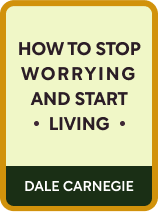

This article is an excerpt from the Shortform book guide to "How to Stop Worrying and Start Living" by Dale Carnegie. Shortform has the world's best summaries and analyses of books you should be reading.
Like this article? Sign up for a free trial here .
Looking for How To Stop Worrying and Start Living quotes? What are some of the most noteworthy passages worth revisiting?
In How To Stop Worrying and Start Living, Dale Carnegie offers timeless advice to stop worry from ruling your life. The following How To Stop Worrying and Start Living quotes highlight some of his key recommendations.
Keep reading for How To Stop Worrying and Start Living by Dale Carnegie.
How To Stop Worrying and Start Living: Quotes by Dale Carnegie
In How To Stop Worrying and Start Living, Dale Carnegie—author of the bestseller How to Win Friends and Influence People—offers timeless advice for coping with excessive worry and anxiety. He discusses how to cultivate a worry-free mindset and explores ways to work through common worry triggers. Below are some How To Stop Worrying and Start Living quotes with explanations.
“I found it wasn’t so hard to live only one day at a time. I learned to forget the yesterdays and to not think of the tomorrows. Each morning I said to myself, ‘Today is a new life.”
According to Carnegie, living one day at a time helps engage you more deeply with the life that’s sitting right in front of you. Besides, when you focus on doing “today” as best you can, you naturally interrupt a wasteful thought process that many of us are guilty of—putting off living our lives because we’re focused on a far-off, attractive future. Shutting out worries about the future ensures that you’re only carrying one day’s worth of stress at a time, which allows you to keep your thinking clear and logical.
“If a person will devote their time to securing facts in an impartial, objective way, their worries will usually evaporate in the light of knowledge.”
According to Dale Carnegie, worry derives from being outside of the present moment. In How to Stop Worrying and Start Living, he presents “thoughtful analysis”—a three-step approach to working through worry by breaking it down into its basic facts. Objective, impartial analysis helps neutralize your emotions so that you can look at them clearly and calmly. This allows you to make sound decisions and find the best possible solutions.
“When we have accepted the worst, we have nothing more to lose. And that automatically means – we have everything to gain!”
In some situations, when all you can do is wait for the outcome, you’ll need a quick way to stop your worry from spiraling out of control. In these situations, Carnegie’s solution is to determine what the worst possible outcome would be and accept it instead of trying to convince yourself it won’t. This spurs you to shrink your focus to how you’ll deal with the aftermath. If you imagine that you’ll lose your job, you might think, “I have a lot of experience in this field, so I can probably find a new job without too much trouble.”
Once you’ve accepted the worst outcome and considered how you’ll deal with it, you can focus your energy on finding ways to mitigate your current situation as best you can. You might examine your organization’s budget to find reasonable places to cut back and recover the $500,000 over a relatively short amount of time.
When you’re worried, your judgment tends to become cloudy and panicky—you become lost in thoughts of everything that could happen. By forcing you to consider and accept the worst, this exercise clears your thinking so that you can more effectively find immediate solutions to your problem.
“Criticism is dangerous, because it wounds a person’s precious pride, hurts his sense of importance and arouses resentment.”
One aspect of life that stings almost everyone is criticism. Criticism triggers a host of unpleasant emotions and takes on a toll on one’s self-esteem. In How to Stop Worrying and Start Living, Carnegie presents three ways to dealing with anxiety triggered by criticism: 1) remember that you’re not perfect, 2) do your best, and 3) think of unjustified criticism as a compliment.

———End of Preview———
Like what you just read? Read the rest of the world's best book summary and analysis of Dale Carnegie's "How to Stop Worrying and Start Living" at Shortform .
Here's what you'll find in our full How to Stop Worrying and Start Living summary :
- What worry is and how it manifests both physically and mentally
- How to deal with worry about work, finances, and criticism
- How to cultivate a less worried mindset






